HarmonyOS 鸿蒙Next中Tabs组件在翻页时页面的刷新问题
HarmonyOS 鸿蒙Next中Tabs组件在翻页时页面的刷新问题 为了方便讨论,我们不妨使用官方案例来说明,链接如下:示例3自定义页签切换联动。
案例中,所有tabContent的内容都是在一个ets文件中。
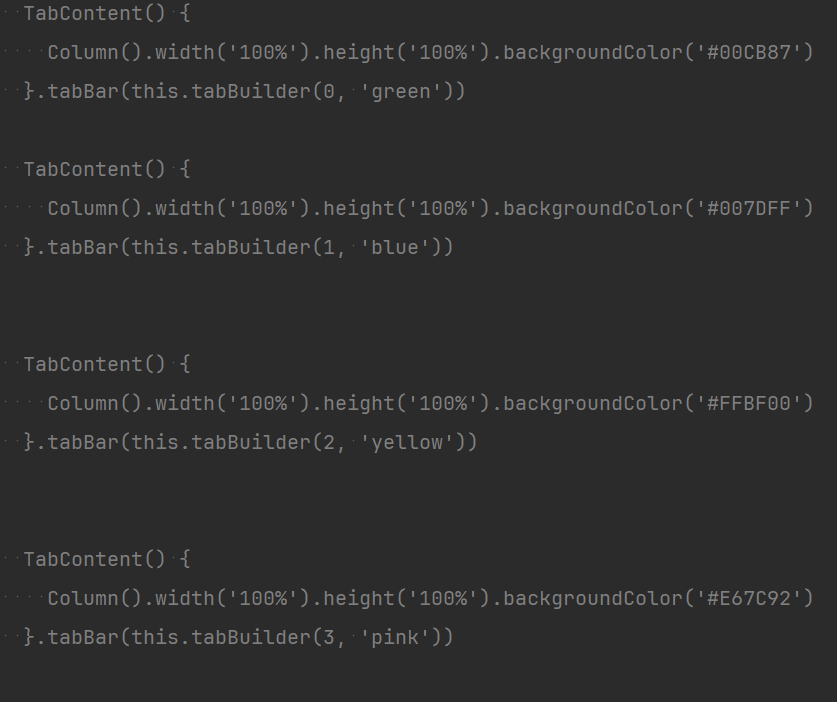
所以,页面滚动效果都没问题。
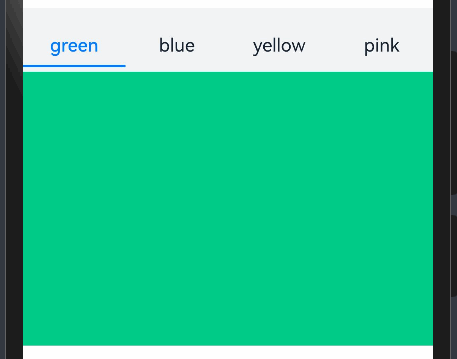
但是,如果我稍加改动,将原先tabContent的内容拆分到4个ets文件中,其他什么代码都不动。
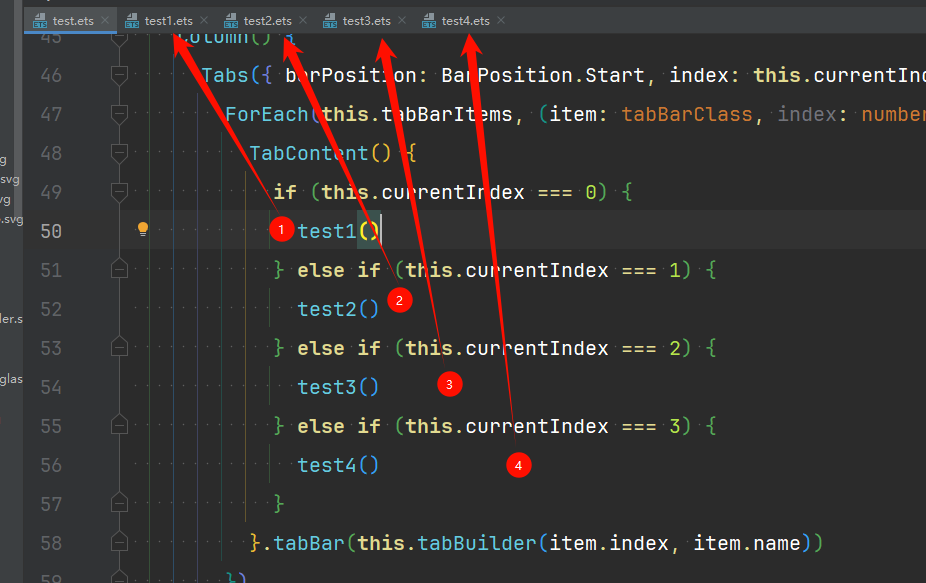
问题出现了!只有当页签滚动到位后,页面内容才触发刷新。
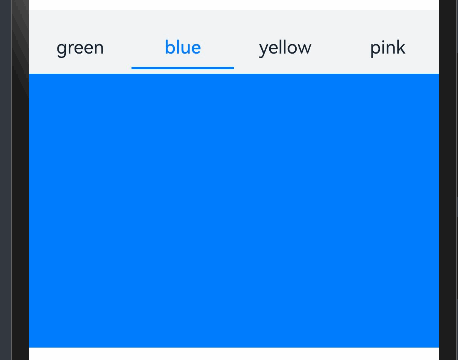
这是为什么呀?
代码如下:
import { test1 } from './test1';
import { test2 } from './test2';
import { test3 } from './test3';
import { test4 } from './test4';
interface tabBarClass {
index: number
name: string
bgc: string
}
@Entry
@Component
struct TabsExample {
@State fontColor: string = '#182431';
@State selectedFontColor: string = '#007DFF';
@State currentIndex: number = 0;
@State selectedIndex: number = 0;
private controller: TabsController = new TabsController();
private tabBarItems: tabBarClass[] = [
{ index: 0, name: 'green', bgc: '#00CB87' },
{ index: 1, name: 'blue', bgc: '#007DFF' },
{ index: 2, name: 'yellow', bgc: '#FFBF00' },
{ index: 3, name: 'pink', bgc: '#E67C92' }
]
@Builder
tabBuilder(index: number, name: string) {
Column() {
Text(name)
.fontColor(this.selectedIndex === index ? this.selectedFontColor : this.fontColor)
.fontSize(16)
.fontWeight(this.selectedIndex === index ? 500 : 400)
.lineHeight(22)
.margin({ top: 17, bottom: 7 })
Divider()
.strokeWidth(2)
.color('#007DFF')
.opacity(this.selectedIndex === index ? 1 : 0)
}.width('100%')
}
build() {
Column() {
Tabs({ barPosition: BarPosition.Start, index: this.currentIndex, controller: this.controller }) {
/*
ForEach(this.tabBarItems, (item: tabBarClass, index: number) => {
TabContent() {
if (this.currentIndex === 0) {
test1()
} else if (this.currentIndex === 1) {
test2()
} else if (this.currentIndex === 2) {
test3()
} else if (this.currentIndex === 3) {
test4()
}
}.tabBar(this.tabBuilder(item.index, item.name))
})
*/
TabContent() {
Column().width('100%').height('100%').backgroundColor('#00CB87')
}.tabBar(this.tabBuilder(0, 'green'))
TabContent() {
Column().width('100%').height('100%').backgroundColor('#007DFF')
}.tabBar(this.tabBuilder(1, 'blue'))
TabContent() {
Column().width('100%').height('100%').backgroundColor('#FFBF00')
}.tabBar(this.tabBuilder(2, 'yellow'))
TabContent() {
Column().width('100%').height('100%').backgroundColor('#E67C92')
}.tabBar(this.tabBuilder(3, 'pink'))
}
.vertical(false)
.barMode(BarMode.Fixed)
.barWidth(360)
.barHeight(56)
.animationDuration(400)
.onChange((index: number) => {
// currentIndex控制TabContent显示页签
this.currentIndex = index;
this.selectedIndex = index;
})
.onAnimationStart((index: number, targetIndex: number, event: TabsAnimationEvent) => {
if (index === targetIndex) {
return;
}
// selectedIndex控制自定义TabBar内Image和Text颜色切换
this.selectedIndex = targetIndex;
})
.width(360)
.height(296)
.margin({ top: 52 })
.backgroundColor('#F1F3F5')
}.width('100%')
}
}
其中,TabContent中涉及的4个页面都很简单,大致如下:
@Entry
@Component
export struct test1 {
build() {
Column().width('100%').height('100%').backgroundColor('#00CB87')
}
}
更多关于HarmonyOS 鸿蒙Next中Tabs组件在翻页时页面的刷新问题的实战教程也可以访问 https://www.itying.com/category-93-b0.html
你好。
这是写法使用的问题。首先Tabs容器作为页签容器,里面的页签对应的是TabContent。一个页签就是一个Content。
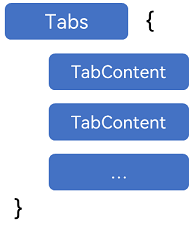
所以你想把页签抽离出来写是ok的,只不过在主页面要把TabContent留下,把里面的内容抽离成自定义组件。
Tabs() {
TabContent() {
this.APage()
}
.tabBar('首页')
TabContent() {
this.BPage()
}
.tabBar('推荐')
TabContent() {
this.CPage()
}
.tabBar('发现')
TabContent() {
this.DPage()
}
.tabBar("我的")
}
更多关于HarmonyOS 鸿蒙Next中Tabs组件在翻页时页面的刷新问题的实战系列教程也可以访问 https://www.itying.com/category-93-b0.html
在HarmonyOS Next中,Tabs组件切换时默认会触发页面的重新渲染。若需控制刷新行为,可使用@State或@Prop装饰器管理组件状态。通过onChange事件监听Tab切换,结合条件渲染避免不必要的刷新。对于数据更新,推荐使用@Link实现父子组件数据同步。若需保持页面状态,可配合LazyForEach和cachedCount属性优化性能。Tabs的preload属性可预加载相邻页内容。
这个问题是由于组件加载机制导致的。在HarmonyOS Next中,当TabContent内容拆分到不同文件时,系统会按需加载这些组件,而不是预加载。
关键点分析:
- 单文件情况下,所有TabContent内容已预加载,切换时直接显示
- 多文件情况下,TabContent作为独立组件,会在实际需要显示时才触发加载
- 当前实现中,Tab切换动画和内容加载是同步进行的
解决方案建议:
- 使用预加载机制,在Tabs初始化时提前加载所有TabContent组件
- 或者在onChange回调中主动触发内容更新,而不是依赖系统自动刷新
代码修改方向:
// 提前声明组件引用
private tabComponents = [test1, test2, test3, test4]
// 在build方法中使用动态组件
ForEach(this.tabBarItems, (item: tabBarClass) => {
TabContent() {
this.tabComponents[item.index]()
}.tabBar(this.tabBuilder(item.index, item.name))
})
这种实现方式可以保证组件提前加载,避免切换时的延迟问题。






